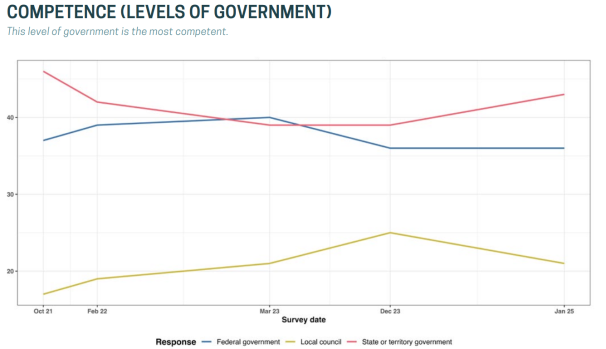People’s wellbeing – not transitory policies – should be the top priority for governments, a survey reveals.
Conducted in January by not-for-profit think tank the Centre for Policy Development, the annual survey tracks public expectations of government and democracy. Among the key findings: respondents overwhelmingly – 76 per cent – believe government should put people’s wellbeing ahead of short-term goals.
“People see a focus on short-term outcomes,” said the CPD’s Curtis Moore – one of the authors of a report detailing the findings. “We ran this poll leading up to an election campaign and people were already beginning to see politicians offering quick sugar hits.”
Moore told GN, while Australians will no doubt be pleased to receive energy bill relief, the survey shows people are looking for big, ambitious policy. “If there was a major policy announcement around low or no cost childcare for every Australian, that’s the kind of thing Australians can get behind and go for,” he said.
Meanwhile, more than 60 per cent of the 1,125 people surveyed think governments prioritise short-term gains over long-term challenges. “Australians aren’t convinced that existential challenges like climate disasters and housing affordability are top priorities, with 63 per cent believing that quick wins are favoured in politics,” says the report.

The survey also shows Australians continue to place importance on a decent standard of living, with almost one in three – 31 per cent – selecting it as a major concern.
“That’s something that popped up just after Covid and it’s stuck firm since,” Moore told GN. “We’ve been focused on the cost of living for a few years now, I think that’s firmly entrenched – at least for the next couple of years – as the main thing that people see when they want governments to provide support.”
The delivery of essential services also ranks high with respondents, with 85 per cent of Australians wanting governments to maintain the capacity to provide healthcare, education, welfare and justice.
When it comes to which level of government delivers the most direct benefit, the survey shows Australians view state governments most favourably – 46 per cent. “This likely reflects the visibility of state-managed services, shaping perceptions of where the greatest benefit is received,” says the report. Federal government scored 32 per cent; councils 22 per cent.

State governments were also perceived as the most competent level of government, scoring 43 per cent. Federal government came second – 36 per cent. Local governments were rated as the least competent, rating just 21 per cent.
However, along with state governments (41 per cent), councils are seen as better reflecting community needs and interests (38 per cent) than the federal government (20 per cent).
Elsewhere in the report, more than half of respondents – 55 per cent – said they feel unrepresented by politicians and want a greater say in policymaking. “People want a greater say in the priorities for government. People feel they’re not really being listened to … policy isn’t directly aligned with what they think is the most important thing to be focusing on,” said Moore.
“From there, you get people feeling a bit disenfranchised, a bit disconnected, a bit unsure about how government and politicians represent their interests,” he added.
People feel they’re not really being listened to
Despite the negative reactions, the survey shows most Australians – 33 per cent – remain optimistic. “Australians aren’t turning away from government or turning away from democracy. We’re not looking at this Trumpian-style anti-establishment attitude. People still have a fairly high degree of confidence in the role of government and what government should be,” said Moore. “The pessimism comes with the political machine itself, politics in general and politicians.”
Accompanying the pessimism is a lack of trust. Echoing earlier comments, Moore told GN, to restore that trust, governments must show that they can govern for the long term. “Earning people’s trust is about making some of the hard calls, making some of those big long-term, major policy moves that people can look at and think that’s definitely something that’s going to help me, it’s something I can believe in. Where the trust is slightly eroding is people see government going through the motions and playing it safe.”




Leave a Reply